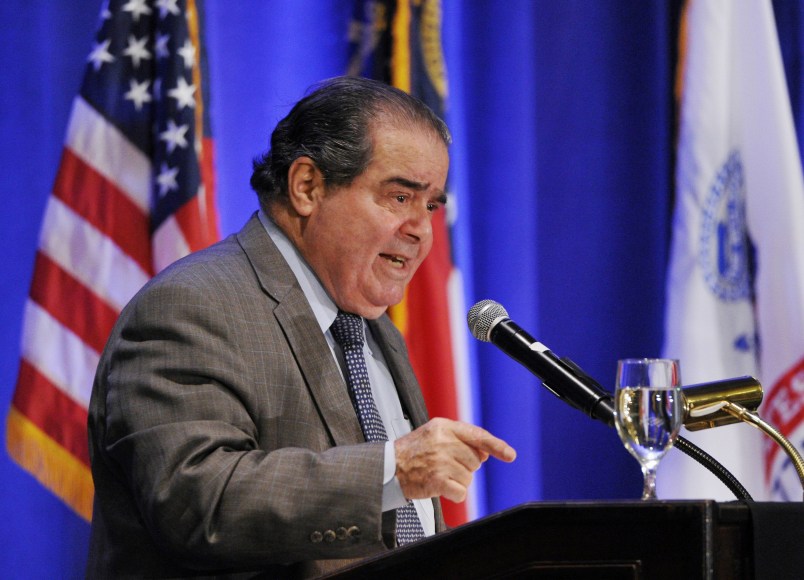Upon striking down Pennsylvania’s gay marriage ban Tuesday, a federal judge cited Justice Antonin Scalia’s “cogen[t]” argument that the Supreme Court had essentially paved the way for nationwide marriage equality last year.
Here’s the relevant passage from George W. Bush-appointed Judge John E. Jones III in his 39-page opinion:
As Justice Scalia cogently remarked in his dissent, “if [Windsor] is meant to be an equal-protection opinion, it is a confusing one.” Windsor, 133 S. Ct. at 2706 (Scalia, J., dissenting). Although Windsor did not identify the appropriate level of scrutiny, its discussion is manifestly not representative of deferential review. See id. (Scalia, J., dissenting) (observing that “the Court certainly does not apply anything that resembles [the rational-basis] framework” (emphasis omitted)). The Court did not evaluate hypothetical justifications for the law but rather focused on the harm resulting from DOMA, which is inharmonious with deferential review.
It was a reference to Scalia’s scathing dissent against the Court’s 5-4 opinion that struck down a portion of the Defense of Marriage Act which prohibited federal recognition of same-sex marriages. The Reagan-appointed justice warned that the majority decision — despite officially staying neutral on whether gay marriage was a Constitutional right — relied upon reasoning that would lead to that conclusion.
“As I have said, the real rationale of today’s opinion … is that DOMA is motivated by ‘bare … desire’ to harm couples in same-sex marriages,” Scalia wrote in the 2013 dissent. “How easy it is, indeed how inevitable, to reach the same conclusion with regard to state laws denying same-sex couples marital status.”
Jones is one of several district court judges in numerous states to cite Scalia’s prescient warning about the broader legal consequences of the DOMA reasoning. Same-sex marriage has enjoyed a remarkable winning streak since the ruling.







Every time a state makes such a decision, I imagine that Scalia’s blood pressure goes up one point.
I smell roasted cannoli.
Let’s just keep rubbing it in his nose, jurists.
From the opinion:
“In future generations, the label same-sex marriage will be abandoned, to be replaced simply by marriage,” Judge John Jones concluded in the Pennsylvania case. “We are a better people than what these laws represent, and it is time to discard them into the ash heap of history.”
Rick “Frothy” Santorum backed this judge before W appointed him.
There’s gonna be a heartache tonight, a heartache tonight, I know, I just know…
This is the same judge, btw, who pretty much killed off “Intelligent Design” mis-education in PA public schools.
You should all read the actual opinion following the article. It’s fucking spectacular and guaranteed to render the heads of the NOM crowd duly exploded.